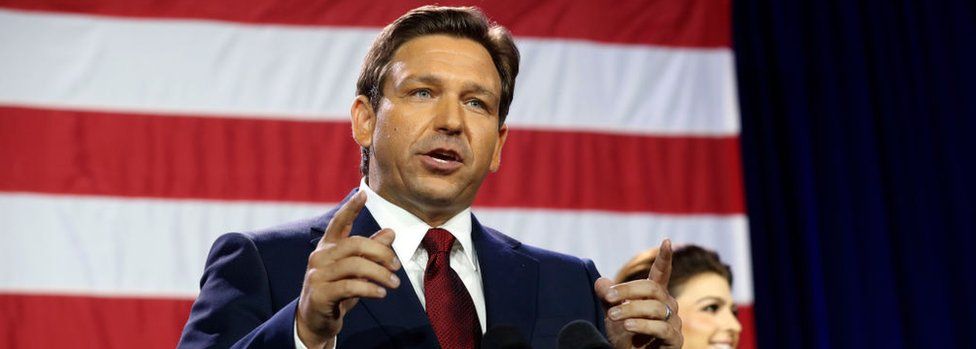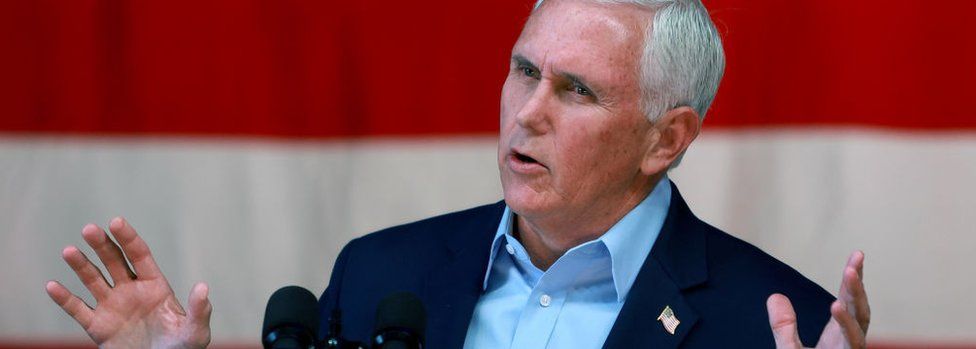The path to the 2024 US presidential election begins almost as soon as midterm elections end – and several candidates are already waiting in the wings.
Former president Donald Trump has announced he will run for the party’s nominating contest, vowing to “make America great and glorious again”.
But while he remains popular with Republican voters, an underwhelming midterm performance, due in part to losses for Trump-endorsed candidates, has left him more vulnerable.
The ex-president, who will be 78 in two years, is likely to face a stiff challenge from a coterie of Republican hopefuls, including some who once backed him.
Nikki Haley announced her bid for the presidency in Mid-February, becoming the first major Republican candidate to commit to taking on Mr Trump.
Once considered one of the Republican Party’s brightest young prospects, Nikki Haley has kept a lower profile in recent years.
Nikki Haley
Born in South Carolina to Punjabi Sikh immigrants, Ms Haley became the youngest governor in the country in 2009. She earned national attention in 2015 after calling for the removal of the Confederate flag from the South Carolina Capitol.
Despite saying she was “not a fan” of Mr Trump in 2016, she later accepted his nomination to be the US ambassador to the United Nations, a tenure marked by her dramatic exit from a UN Security Council meeting as a Palestinian envoy was speaking.

Ron DeSantis
Florida Governor Ron DeSantis has worked hard to emulate Mr Trump, and is viewed as a strong candidate to supplant him at this early stage.
He romped to re-election in the midterm elections by more than 1.5 million votes, the largest margin in the state in more than four decades.
At 44 years old, the Harvard and Yale-educated lawyer is still a relative newcomer in US politics.
He once served in the US Navy, including a tour in Iraq. He was also a little-known member of the House of Representatives from 2013 to 2018.
But Mr DeSantis has seen his star rise considerably since he became governor in 2019, a role in which he positions himself as an enthusiastic champion of conservativism.
He eschewed mask and vaccine mandates during the Covid pandemic, signed anti-riot laws in the wake of racial justice protests, and backed legislation to limit LGBT education in primary schools. Under his tenure, Republican voters outnumber Democrats in the state for the first time.
Mr Trump appears to be paying very close attention, recently nicknaming his rival “Ron DeSanctimonious” and threatening to release unflattering details about him if he runs in 2024.

Mike Pence
For four years, Mike Pence was a loyal deputy to Mr Trump as his vice-president – until 2021’s Capitol riot splintered their relationship.
The son of a Korean War veteran, Mr Pence began his career in conservative politics as a talk radio host.
He was elected to the House in 2000 and served until 2013, describing himself as a “principled conservative” and aligning with the Tea Party movement.
He also served as governor of Indiana from 2013 to 2017. In that role, he passed the largest tax cut in state history, and signed bills to restrict abortion and protect religious freedom.
Mr Pence, 63, is a born-again evangelical Christian and his addition to the 2016 presidential ticket is credited with helping turn out evangelicals, a crucial voting bloc, for Mr Trump.
Calm and soft-spoken, he was seen as an effective surrogate to the bomb-throwing Donald. But Mr Trump turned on him for lacking “courage” after he refused to help overturn the 2020 election results.
Pro-Trump rioters stormed the US Capitol in January 2021 and were heard chanting “Hang Mike Pence!”. At one point, they were reportedly within 40ft (12m) of the vice-president.
The two have kept their distance since then, with Mr Pence endorsing several Republican candidates during the 2021 midterm elections, including Georgia Governor Brian Kemp, whose opponent Mr Trump backed.

Liz Cheney
The daughter of former vice-president Dick Cheney was once a rising star in the Republican Party, serving as its third-highest ranking member in the House from 2019 to 2021.
A fiscal and social conservative with interventionist foreign policy views, she won her father’s old seat in 2017, going on to represent Wyoming in Congress, and voted in lockstep with the Trump administration.
But she fell out of favour with Republicans after repeatedly criticising Mr Trump and then voting to impeach him for his role in the 6 January Capitol riots.
She was dumped from her leadership post, formally reprimanded and is no longer recognised by the Wyoming Republican Party.
Ms Cheney, 56, went on to become one of only two Republicans on the congressional committee investigating the Capitol riots. As vice-chair, she has led the charge to hold Mr Trump and others accountable.
The role cost her her job this August, with the former president endorsing an opponent who thrashed her by a near-40% margin in the Wyoming primary race.
But Ms Cheney still considers herself a Republican, vowing to do whatever she must “to help restore our party”.
 IMAGE SOURCE,GETTY IMAGES
IMAGE SOURCE,GETTY IMAGESMike Pompeo
As a congressman from Kansas, Mike Pompeo issued a stark warning in 2016 that Mr Trump would be “an authoritarian president who ignored our Constitution”.
An Army veteran who graduated first in his class from the prestigious West Point military academy, he served in the House between 2011 and 2017.
The Harvard-educated lawyer would go on to serve as CIA director and secretary of state in the Trump administration.
He played a role in major US foreign policy overtures, from helping plan Mr Trump’s summits with North Korea’s Kim Jong-un to helping overturn decades of US policy toward Israel. But he also courted controversy, including clashes with reporters and at least two ethics investigations.
 IMAGE SOURCE,GETTY IMAGES
IMAGE SOURCE,GETTY IMAGESGlenn Youngkin
Glenn Youngkin thrilled the Republican Party when he won the governor’s race in Virginia in 2021. A political novice who spent 25 years at the Carlyle Group private equity firm, he beat a man who had been in Democratic politics since the 1980s.
In a state that has trended toward Democrats in recent years, Mr Youngkin criticised partisan politics as “too toxic” and campaigned on a tone of bipartisanship.
But the 55-year-old has waded into hot-button topics since his first day in charge, from revoking the state’s Covid-19 restrictions to banning the teaching of critical race theory in schools.
He supported Republicans around the country in the midterm elections. At one campaign stop, he drew criticism for making light of the violent assault of House Speaker Nancy Pelosi’s husband and later apologised.
 IMAGE SOURCE,GETTY IMAGES
IMAGE SOURCE,GETTY IMAGESRick Scott
Rick Scott, a 70-year-old lawmaker from Florida, was tasked with helping Republicans win back the Senate during the midterms.
He failed in that goal, but in the key campaign role, he backed and raised money for candidates all around the country – ingratiating himself to potential supporters.
A former two-term Florida governor, he has been under fire from Democrats recently after proposing major reductions in the size of the federal government.
Others who could run
Tim Scott: The 57-year-old from South Carolina is the first African-American politician to serve in both chambers of Congress and is the first black Republican Senator since 1979.
Ted Cruz: The senator from Texas, 52, made a strong showing in the Republican primary for the 2016 presidential election before placing second behind Mr Trump.
Larry Hogan: A skin cancer survivor, the moderate 66-year-old Republican has served as governor of Maryland – a Democrat-friendly state – since 2015.
Greg Abbott: The first Texas governor to use a wheelchair, Mr Abbott, 65, has championed conservative policies since his election in 2014.
Kristi Noem: South Dakota’s first female governor, 51, garnered national attention with her opposition to Covid restrictions and has been eager to wade into national conversations.




![South Korean troops of the White Horse Division with three Vietnamese prisoners in 1966 [File: Hong/AP Photo]](https://www.aljazeera.com/wp-content/uploads/2023/02/AP6611301174.jpg?w=770&resize=770%2C521&quality=80)












